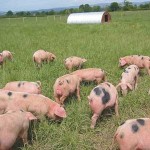In response to the post Drinking Milk From Abused Cows, one of my readers commented, “I didn’t watch the video. I’m far to sensitive to watch cruelty. We started buying organic milk many years ago. Do you think that means the cows are treated better?”
In response I did a little digging and thought I’d share what I discovered.
You ask a great question, one we should all be asking, “What exactly does the organic label mean?” We can easily be fooled into thinking it means a pastoral setting that harkens back to Little House on the Prairie days, but as we learned with Organic Eggs and Factory Farming, that is not always the case.
With respect to dairy, farms are inspected, but an inspection is only as good as the regulations it is meant to adhere to. Canadian regulations for organic dairy farming (scroll down for the details) cover access to outdoors, quantity and quality of grazing, feed and supplement quality, allowable medications, minimum acreage per animal and other health and welfare criteria. As for general welfare and handling, it’s a bit worrisome that the documentation refers to “guidelines” rather than standards.
In a nutshell, we can’t all get out to the farm where our milk was produced to see the cows in question, but you’re on the right track making inquiries about what standards include and making ethical choices based on what you learn. Organic is better than factory farming and is definitely a step in the right direction both for our health and for the welfare of the animals.
I did a little more digging and found Animal Welfare at a Glance which compares standard factory farming, BC SPCA and BC Certified Organic regulations with respect to animal welfare and handling. I’m glad to see that these requirements are more specific, but a lot is still left up to interpretation. What does “Animals must be treated humanely, but no specific requirements” mean?
PS: I concur with your decision not to watch the video. It’s disturbing and heartbreaking, but many people won’t believe until they see it, and are only motivated to change behaviour by “shock and awe” proof.
Recommendations Alone Mean Nothing
In addition to the documents listed above, the recent high profile of animal cruelty in the BC dairy industry has generated public awareness of the BC SPCA recommendation that the Canadian Code of Practice for the Care and Handling of Dairy Cattle be passed into law in BC. Hello, people! This document was published in 2009 and is clearly a long time overdue to raise the standard of animal care.
It’s not enough to have recommendations, we need to make them law.
 It’s very clear there are many people spending a great deal of time and energy promoting improvements in how we treat the animals who provide us with food. Now we need to band together and support shifting them from recommendations into laws that can be enforced and become common practice. Here’s to happy, healthy livestock!
It’s very clear there are many people spending a great deal of time and energy promoting improvements in how we treat the animals who provide us with food. Now we need to band together and support shifting them from recommendations into laws that can be enforced and become common practice. Here’s to happy, healthy livestock!
Additional Resources
PS: If you want to know more about organic livestock management for all manner of species check out the Organic Agriculture Centre of Canada’s Animal Welfare Task Force. Another excellent storehouse of information is the Certified Organic Associations of BC covering topics like animal welfare in general, organic dairy farming specifically, and all manner of information on other organic food production.





